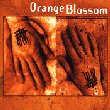
 France - Luna Kafé - Full Moon 17 - 03/13/98
France - Luna Kafé - Full Moon 17 - 03/13/98
Orange Blossom
Orange Blossom
Lytch/Prikosnové nie
After the rock of Les Thugs and the pop of the
Panorama compilation,
here is the very complicated music of
a French group named Orange Blossom and their first eponymous album.
Complicated, but in a good sense. It's the only word I think of after
listening to this album for the first time. I'm bound to say that
Orange Blossom makes an impressive mix of musical styles,
sometimes disarming, but never wearisome: now melodic, now forceful.
Sometimes with an atmosphere like from a ritual ceremony.
Now techno rhythms - but not for an evening of dancing - now ethnic...
and sometimes all this at one and the same time. In fact, at the
beginning of a song, it's impossible to have any idea about the final
style of this song. We are only sure of the absence of the bass, and
the presence of few sounds of the guitar.
But here is the group, three musicians who are: Carlos Banz
(drums, djembe, programming), Jay C (vocals, keyboards, programming) and
X (violin). And the songs? Seven songs which I'll describe in details:
1. Anaconda Girl: it begins with quiet percussion, techno-tones. Then there
is the violin, with Jay C's growing voice. A dominant set of
percussion, in particular with a great ethnic djembe sound, until the brutal
end of the song. Like all the other songs end, except the last one.
2. Maria Del Sol: a wonderful arabian voice, followed by quiet
drums and the sad sound of a violin. Very melancholic.
Again this voice; it seems to harangue the crowd. Then,
an "explosion" of percussion and... the violin! Harrowing, astonishing, beautiful!
3. Bata: the only track with guitar sounds (very cautious).
Ethnic in the beginning, it sounds like the music of Spiritchaser
by Dead Can Dance, but after a relative quietness comes techno-atmosphere with
some hardcore/techno-core passages, especially the voice (Prodigy-like?).
This song shows us the difficulty to classify the music of Orange Blossom,
subtle mixing of ethnic melody and techno or trip-hop sounds (Tricky, not
Portishead).
4. N.: for a break (1'15) of violins and keyboards.
5. Die Stadt: the best song of this album, with a wonderful piano (Minimal
Compact and Childhood's End from The Figure One Cuts comes to
mind ?). Then, the techno rhythms, and again this piano and the violin and this voice.
6. I'm Dying: very ethnic, like Dead Can Dance, but more and more rhythmic
(nearly in a trance ?). A big beginning with djembe, with the voice in a
same style. After 3'40 the djembe solo ends. Phew! More "classic" drums,
again in the DCD's spirit, and again this wonderful arabian voice. 6'29, and
this brutal end.
7. Trinity: violin, violin, muffled voice, very quiet, and this intruding
sound of percussion. The tempo gets quicker, the djembe comes back, like an explosion, but
not for a long time. And then it's the end. Very quiet, as if to pacify the atmosphere after
these extraordinary thirty six minutes of listening.
One last detail: notice the beauty of the album-covers of releases by Prikosnové nie (like
Raksha Mancham, Dada's noise, XVIIème Vie, Cherche-Lune, La Socié té des
Timides à la Parade des Oiseaux)
Prikosnové nie, 5 rue Dé siré Colombe 44100 Nantes - France
Tel./Fax: (33) 2 40 73 31 80
Copyright © 1998 Patrick Dubail 
|
